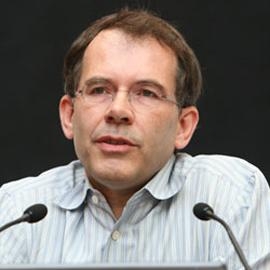 Imbens and colleague Joshua Angrist, an economist at the Massachusetts Institute of Technology, were awarded the prize in recognition of their methodological contributions to the analysis of causal relationships, according to the academy. The pair split the prize with David Card of the University of California, Berkeley, whose empirical contributions to labor economics helped launch a new era of natural experiments across the social sciences.
Imbens and colleague Joshua Angrist, an economist at the Massachusetts Institute of Technology, were awarded the prize in recognition of their methodological contributions to the analysis of causal relationships, according to the academy. The pair split the prize with David Card of the University of California, Berkeley, whose empirical contributions to labor economics helped launch a new era of natural experiments across the social sciences.
In 1996, Imbens and Angrist outlined a highly influential framework for causal inference in the Journal of the American Statistical Association. Their framework has been cited in scientific studies more than 6,000 times, and it has enabled hundreds of experiments exploring causal relationships — such as relationships between income and health, immigration policy and the labor market, and lockdowns and the spread of infection.
Imbens, who spoke on the phone with academy leaders and reporters during the presentation, said he received a phone call with the exciting news while still asleep in California.“It was a little after 2 in the morning here,” he said. “The whole house was asleep; we’d had a busy weekend. I was just absolutely stunned to get a telephone call, and then I was absolutely thrilled to hear the news.”
Asked if he had advice for aspiring economists, Imbens encouraged young people to consider the profession for its flexibility and potential societal impact.
“Economics is a really interesting discipline these days, where you can look at so many questions and... in so many different ways,” he said. “And so for young people thinking about a career in economics, I think that’s a great choice. Economics tends to be a good discipline for allowing people to pursue questions that are quite broad... areas where economists do useful work, both in policy and in many cases in private industry.”
Imbens, now a professor of economics and applied econometrics at Stanford, received his Ph.D. from Brown in 1991. Imbens came to Brown in 1986 when Professor (now Professor Emeritus )Tony Lancaster joined the Brown economics faculty. Professor Lancaster (Tony) mentored him in those formative years.
Professor Rajiv Vohra, who was an Assistant Professor at the time when Imbens was a student, recalls Imbens' early outstanding potential. When the faculty asked Tony where he thought Guido would go after Brown, Tony replied "anywhere". It took some persistence from Tony to get across the simple message that he really could go "anywhere", which turned out to be Harvard. Tony noted that Guido's hobby as a boy was playing simultaneous blindfold chess in the local park, and Tony "always, wisely, declined to give him a game. Think of the loss of face".
After Brown, Imbens went on to teach at Harvard, the University of California, Los Angeles, and U.C. Berkeley before moving to Stanford. He was born in Eindhoven in the Netherlands and received a bachelor’s degree from Erasmus University Rotterdam.
In 2017, Brown awarded Imbens the Horace Mann Medal — an annual honor to a Brown Graduate School graduate who has made important contributions in their field — in recognition of his important contributions to the field of economics. Economics Professor and Department Chair, John Friedman, says "Guido has always been a guiding light, both in the field and for me personally. We were both faculty together for a number of years, and I learned so much from talking with Guido and eventually co authoring a paper with him."